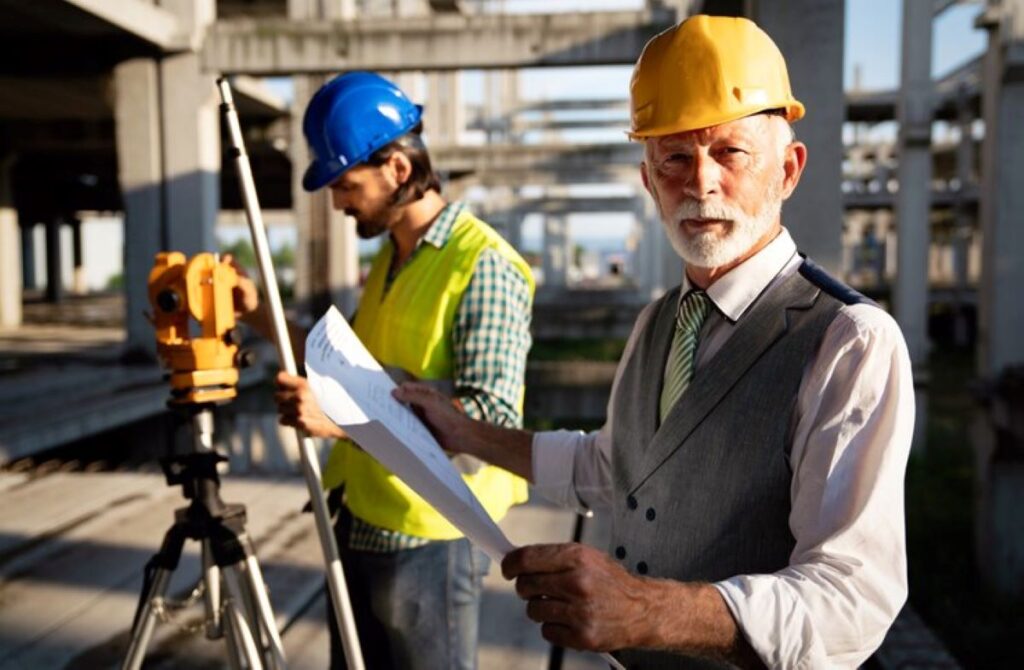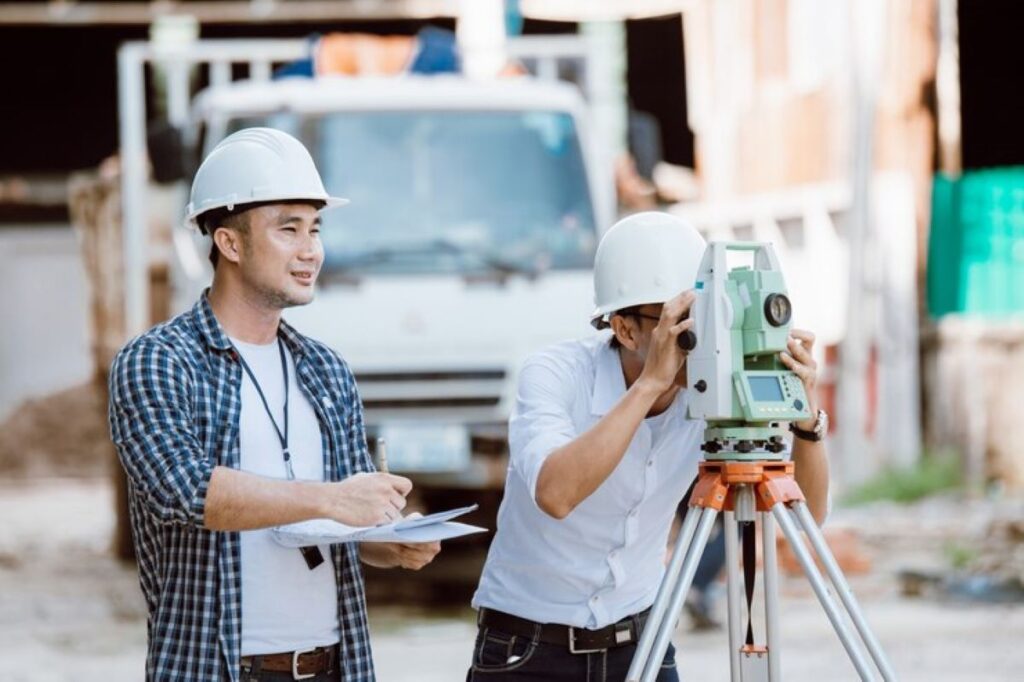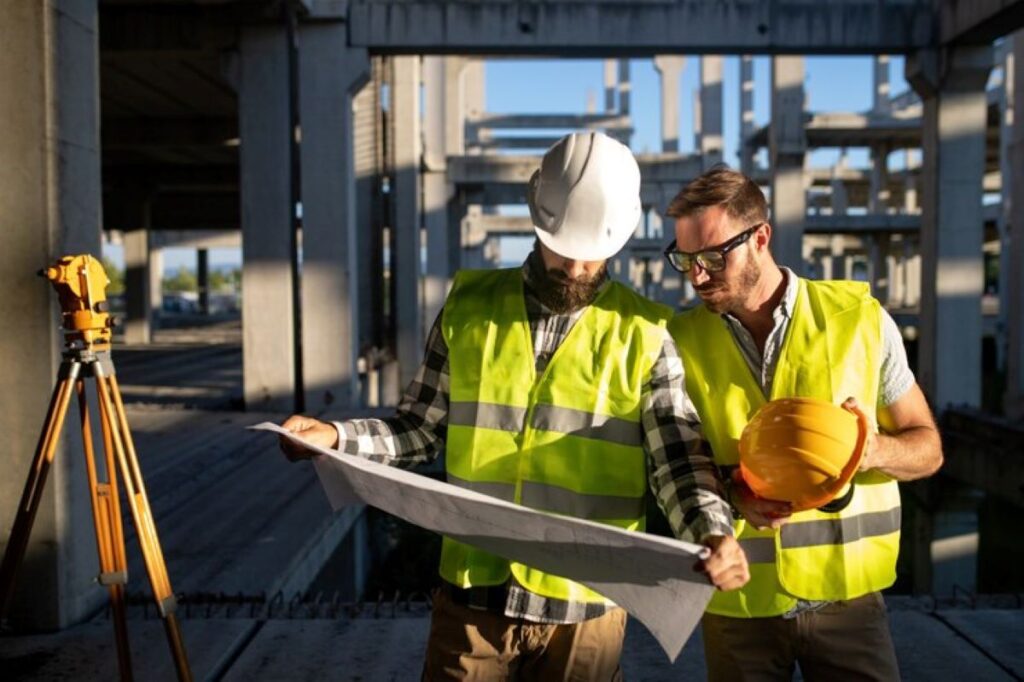Construction surveyors are essential professionals in modern building projects, acting as the crucial link between architectural designs and actual construction. These experts combine technical knowledge with precise tools to turn theoretical plans into accurate physical representations on construction sites.
The role of construction surveyors includes important tasks:
- Establishing exact site boundaries and reference points
- Determining precise locations for structural elements
- Verifying construction progress against design specifications
- Ensuring compliance with local regulations and building codes
Accuracy in building projects is what separates success from expensive failures. Even a small error of a few centimetres can lead to major structural problems, safety issues, and significant financial consequences. Construction surveyors use advanced technology and methods to ensure the highest levels of accuracy throughout each stage of the project.
The impact of surveying on project outcomes can be seen in several ways:
- Fewer construction mistakes and less need for rework
- Better allocation of resources
- Improved management of project timelines
- Enhanced control over costs
- Higher safety standards
With their careful attention to detail and expert knowledge, construction surveyors lay the groundwork for successful building projects. Their work guarantees that structures are built exactly as planned, meeting both technical requirements and quality standards demanded by modern construction.
The Role of Construction Surveyors in Building Projects
Construction surveyors are crucial experts who oversee building projects from the initial groundwork to the final touches. Their duties involve critical tasks that ensure precision and accuracy throughout the construction process.
Site Investigation and Layout Staking
- Conducting detailed site analyses to identify potential challenges
- Marking construction boundaries and structural locations
- Establishing precise reference points for building elements
- Determining optimal positioning for utilities and services
Elevation and Reference Point Management
- Setting benchmark points to maintain consistent height references
- Creating detailed topographic maps of the construction site
- Calculating cut and fill requirements for earthwork operations
- Verifying foundation depths and structural elevations
Construction Progress Verification
- Regular checks of building element positions against design specifications
- Monitoring structural alignment during construction phases
- Measuring distances between components to ensure proper spacing
- Documentation of any deviations from original plans
As-Built Survey Implementation
- Recording final positions of completed structures
- Documenting modifications made during construction
- Creating detailed as-built drawings for future reference
- Verifying compliance with design specifications
These wide-ranging responsibilities require expertise in both traditional surveying methods and modern technological tools. Construction surveyors collaborate closely with project managers, architects, and contractors to uphold accuracy standards that directly influence project success.
Essential Surveying Tasks That Ensure Accuracy
Construction surveying relies heavily on precise physical markers and measurements to guide building processes. Survey stakes serve as critical reference points across construction sites, marking boundaries, alignments, and elevations with exceptional accuracy. It’s essential for construction teams to know how to read land survey stakes to effectively interpret these markers.
Key Physical Markers:
- Wooden Stakes: Marked with specific coordinates and elevations
- Steel Pins: Used for permanent reference points
- Flagging Tape: Colour-coded for different utilities or structures
- Hub and Tack Points: Precise markers for structural elements
Marking Interpretation System:
- Numbers indicate elevation points and distances
- Letters represent specific building components
- Symbols denote utility lines and infrastructure
- Colour codes distinguish between different services:
- Red: Electrical systems
- Blue: Water lines
- Yellow: Gas infrastructure
- Orange: Communication lines
The placement accuracy of these markers directly impacts structural integrity. A misplaced stake by mere millimetres can result in significant structural misalignments. Grade slope measurements require particular precision, as they affect drainage patterns and foundation stability.
Critical Measurements:
- Building corner positions
- Foundation depths
- Wall alignments
- Floor elevations
- Property boundaries
- Infrastructure connection points
These marking systems create a comprehensive guide for construction teams, enabling precise implementation of architectural plans and ensuring structural elements align perfectly with design specifications. It’s also crucial to adhere to survey requirements for residential projects to ensure compliance with local regulations and standards.
Advanced Tools and Technologies Used by Construction Surveyors
Modern construction surveying has evolved beyond traditional measurement tools to embrace sophisticated technology that delivers unprecedented precision and efficiency. The latest surveying equipment combines advanced hardware with intelligent software systems to achieve millimetre-level accuracy.
1. Robotic Total Stations
- Automated target tracking capabilities
- Remote operation functionality
- Built-in data collection systems
- Real-time measurement processing
- Integration with digital design models
2. GNSS Smart Antennas
- Multi-constellation satellite reception
- RTK (Real-Time Kinematic) positioning
- Sub-centimetre accuracy capabilities
- Rapid data acquisition
- Weather-resistant construction

3. 3D Laser Scanning Technology
- High-density point cloud creation
- Rapid large-scale site documentation
- Complex geometry capture
- Digital terrain modelling
- As-built verification capabilities
4. Digital Data Management Systems
- Cloud-based project collaboration
- Real-time data synchronisation
- BIM (Building Information Modelling) integration
- Automated quality control checks
- Advanced data visualisation tools
These technological advancements enable construction surveyors to perform complex measurements with increased speed and reliability. The combination of automated systems and digital workflows reduces human error while providing comprehensive documentation of site conditions. Modern surveying equipment serves as a crucial link between digital design plans and physical construction activities, ensuring precise implementation of architectural and engineering specifications.
Surveying Process Throughout the Construction Lifecycle
The construction surveying process follows a systematic approach across different project phases to maintain precision and accuracy.
1. Initial Site Mapping
- Comprehensive topographic surveys establish existing site conditions
- Documentation of natural features, structures, and utilities
- Creation of detailed site plans and elevation maps
- Analysis of soil conditions and potential construction challenges
2. Project Area Staking
- Physical markers placed to define construction boundaries
- Layout of building footprints and structural elements
- Establishment of reference points for contractors
- Clear marking of utility locations and easements
3. Continuous Verification
- Regular checks during construction phases
- Monitoring of structural alignment and elevations
- Verification of installed components against design specifications
- Documentation of any deviations from original plans
The surveying process integrates with each construction phase, ensuring precise implementation of design plans. Construction teams rely on accurate survey data to position building elements, maintain proper elevations, and align structural components. This systematic approach helps prevent costly errors and maintains project timelines through precise spatial control and ongoing verification procedures.
Benefits of Accurate Construction Surveying for Project Success
Precise construction surveying delivers substantial cost savings through error prevention and efficient project execution. A well-executed survey eliminates costly mistakes that could require extensive rework, material waste, and project delays.
Key Financial Benefits:
- Reduced material wastage through precise quantity calculations
- Minimized labour costs by preventing incorrect installations
- Lower equipment hire expenses due to optimised scheduling
- Decreased risk of legal disputes and associated costs
Time Efficiency Advantages:
- Streamlined construction sequences
- Rapid identification of potential site issues
- Precise coordination between different trade contractors
- Accelerated project completion timelines
The implementation of accurate surveying practices by companies like Wumara Group has demonstrated significant improvements in project outcomes. Recent telecommunications projects for NBN and Telstra achieved completion ahead of schedule, while School Infrastructure NSW projects maintained strict budgetary controls through precise surveying methodologies.
Accurate construction surveying creates a ripple effect of benefits throughout the project lifecycle, from initial groundwork to final structural elements. This precision-driven approach transforms potential challenges into opportunities for enhanced project efficiency.
Selecting Experienced Construction Surveyors: A Key to Optimal Results
Choosing the right construction surveyors can make a significant difference in the success of a project. It’s not just about finding someone who knows how to measure land or buildings; it’s about finding professionals who understand the entire construction process, including the laws and regulations that apply, as well as the latest technology being used in the industry.
What to Look for in a Construction Surveyor
When selecting a construction surveyor, here are some key qualifications you should consider:
- Proven Experience: Look for surveyors who have successfully completed similar projects in the past.
- Valid Certifications: Ensure that they possess all necessary certifications and licenses required by law.
- Familiarity with Equipment: Check if they have experience using modern surveying equipment such as drones or laser scanners.
- Knowledge of Regulations: Verify their understanding of local building codes and regulations which can impact your project.
- Quality Control Measures: Inquire about their quality control processes to ensure accuracy in measurements.
- Safety Protocols: Ask about their documented safety protocols to mitigate risks on-site.
The Importance of Combining Technology with Fundamentals
While it’s important for surveyors to be skilled in using advanced technology, they must also have a strong grasp of fundamental surveying principles. This combination allows them to:
- Use cutting-edge tools for greater precision
- Modify techniques based on specific challenges at each site
- Offer solutions backed by data analysis
- Carry out intricate measurements efficiently
The Role of Effective Communication and Documentation
In addition to technical skills, professional surveyors should also excel at maintaining thorough documentation and communicating effectively with all parties involved in the project. These qualities are crucial for smooth coordination between different teams working on-site and ultimately lead to successful outcomes.

Case Studies Highlighting the Impact of Accurate Surveying in Real-World Projects
Recent telecommunications and government infrastructure projects demonstrate the critical role of precise surveying in successful project delivery.
1. Telstra Network Expansion Project
A complex telecommunications infrastructure upgrade required detailed surveying for optimal tower placement. The surveying team:
- Conducted comprehensive site investigations across multiple locations
- Mapped existing underground utilities to prevent service disruptions
- Provided precise elevation data for tower positioning
- Delivered real-time progress tracking throughout construction
The result: Zero utility strikes and optimal signal coverage across the network.
2. NBN Fibre Network Installation
Precise surveying proved essential for NBN’s fibre optic network expansion:
- Detailed topographic surveys guided cable pathway planning
- Underground utility mapping prevented costly service interruptions
- Regular construction progress monitoring ensured accurate installation
- As-built surveys documented final infrastructure placement
3. School Infrastructure NSW Development
A major educational facility construction project showcased surveying excellence through:
- Initial site investigation revealing challenging ground conditions
- Precise setting-out ensuring building alignment with design specifications
- Regular verification surveys maintaining construction accuracy
- Detailed as-built documentation for future reference
These projects highlight how accurate surveying directly impacts project efficiency, cost management, and successful outcomes in both telecommunications and government infrastructure sectors.
See Also : Utilising Surveyor Engineer Expertise in Construction Projects
Conclusion
The integration of advanced surveying practices is essential for successful building projects. Construction surveyors provide accurate spatial data and ensure construction precision throughout every stage of the project – from initial site mapping to final as-built documentation.
The advancement of surveying technology, along with experienced professionals who are knowledgeable in both traditional and modern methods, establishes a strong foundation for construction excellence. These skilled practitioners:
- Reduce expensive mistakes and delays
- Ensure the stability of structures
- Adhere to design specifications
- Facilitate efficient project completion
The success stories from telecommunications infrastructure and educational facility projects highlight the significant value of precise surveying work. As construction projects become more intricate, the role of qualified surveyors becomes increasingly crucial. Their expertise and commitment to accuracy continue to shape the future of construction, delivering projects that endure over time and meet the highest standards of quality and precision.
